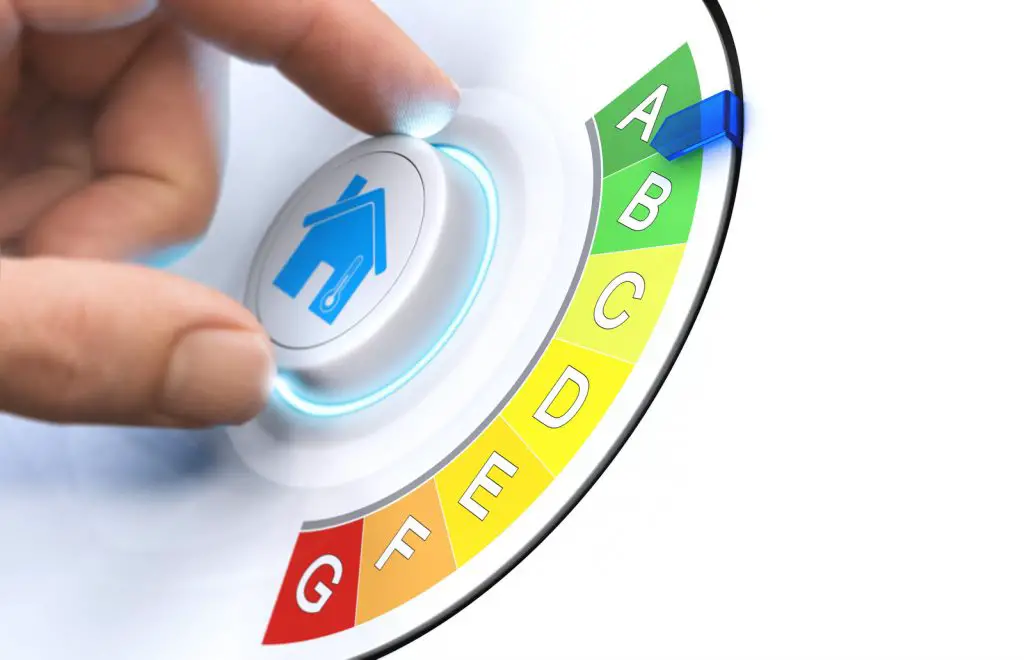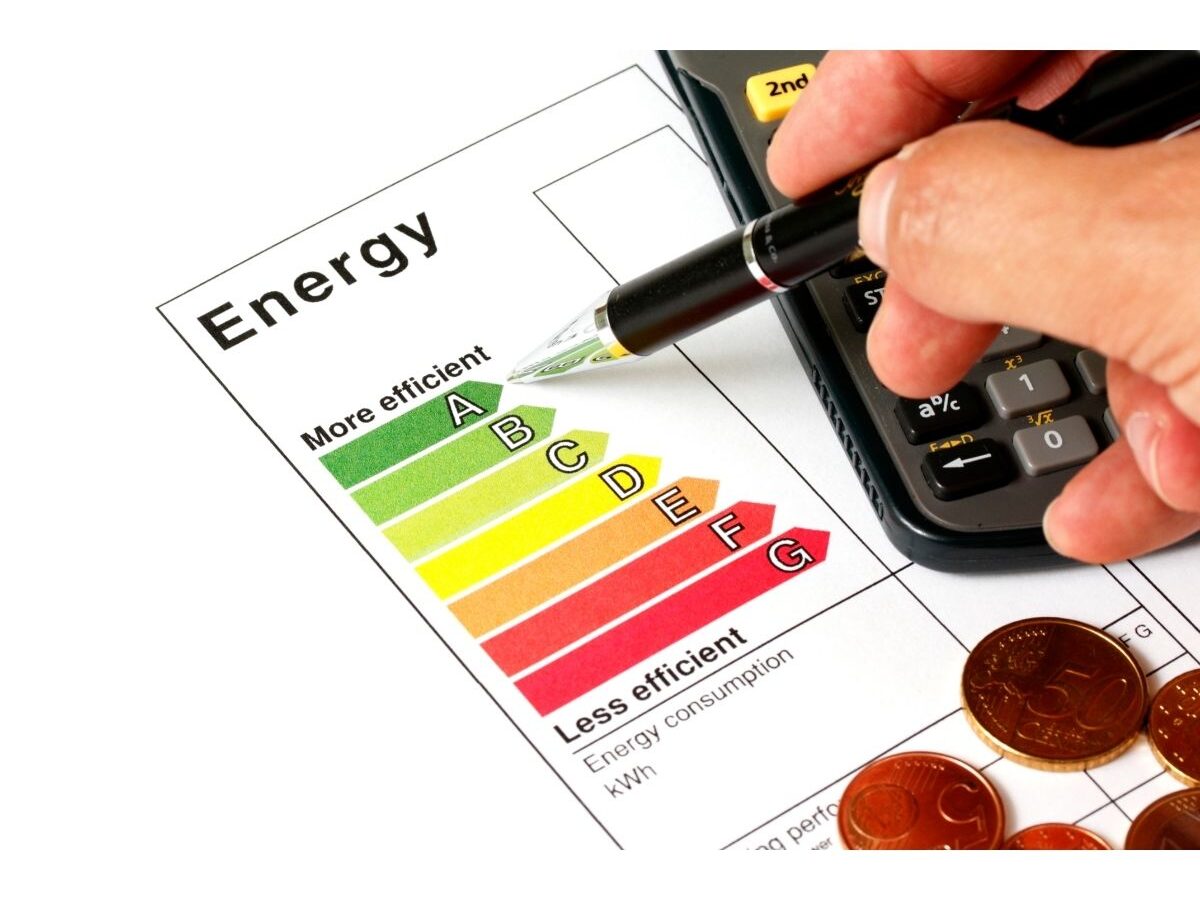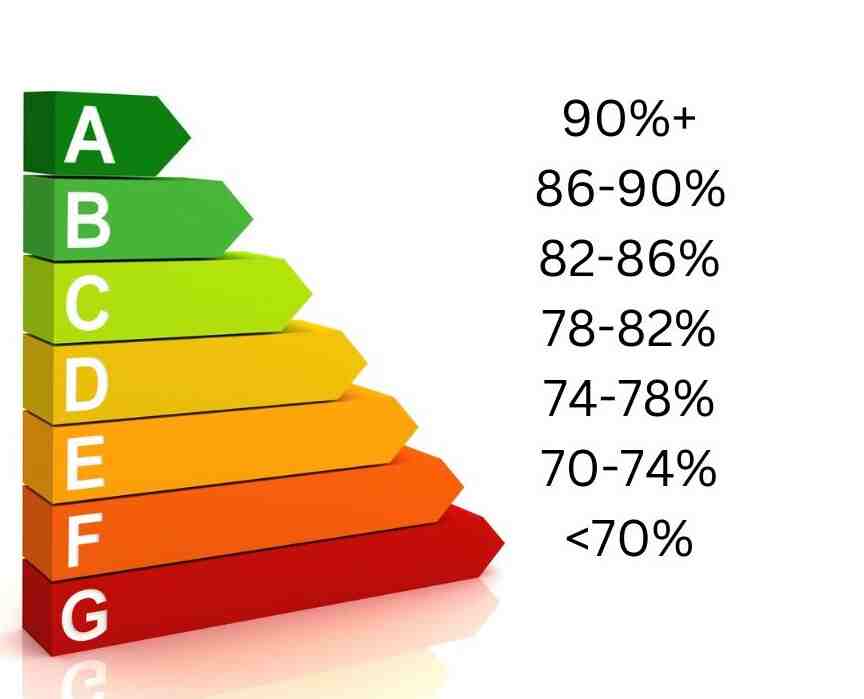A boiler’s energy efficiency is the percentage of useful heat you get from it in relation to the amount of fuel gas that was put in. For example, a boiler is said to be 90% efficient if its heat loss is 10% of the fuel that was input. A boiler can never be 100% efficient as there is always some heat escaping through the flue along with the products of combustion.
Boiler Efficiency Ratings
Boiler efficiency is grouped in bands according to a percentage:
- A – 90% and above.
- B – 86-90%.
- C – 82-86%.
- D – 78-82%.
- E – 74-78%.
- F – 70-74%.
- G – below 70%.
The following ratings are given to boiler efficiency in bands A-G:
How to find out your boiler’s energy efficiency
New boilers will have this label either attached to the boiler casing or enclosed with the User Manual.
Age of the boiler
This is usually a good indicator of how efficient your boiler is likely to be. Like most appliances, the older the boiler, the less efficient components become.
Type of boiler
Do you have a condensing boiler? Condensing boilers recover more energy from the water vapour produced and use this to heat more water. Boilers fitted after 2005 will be condensing. Before this date, non condensing boilers are likely to be a lot less efficient.
Search the boiler database
If you have an older boiler and cannot find the efficiency label, you should be able to search on the Building Energy Performance products database. You will need to know the make, model and heat output in kW of your boiler. Search the database here
How is boiler efficiency measured?
Boiler ratings are a measure of thermal efficiency which is the rate at which the heat exchanger converts the energy into usable heat. Energy Output/Energy Input X 100. The letter ratings from A to G that you see on appliances are based on this percentage. The higher the percentage, the more efficient it is and is given a high rating.

The ErP, or Energy-related Products label is used for modern appliances including boilers and gives consumers an easy and user-friendly comparison of energy efficiency levels so they can make informed choices when purchasing. The labelling starts at A++ which is the most efficient, down to G – the least efficient. At 90%-93%, modern condensing boilers are A-rated.
The higher the rating on the energy scale, the more efficient the appliance is and the less energy it will consume. It is also an indication of how much that appliance will cost to run. Older boilers are less likely to be energy efficient.
What is the most efficient type of boiler?
A combi boiler heats water directly from the mains when you turn on the tap. They are both cost effective and energy efficient as the water is heated instantly rather than being heated and then stored in a cylinder.
A system boiler requires a cylinder for storing hot water and there will be some heat loss. But if they are installed alongside solar thermal systems, they can be a very energy efficient option.
A regular boiler heats up the water in a more efficient way than a combi but as the hot water is stored, there is a heat loss here which makes it less efficient.

Keeping an old inefficient boiler running costs more in annual energy bills than buying a new A rated boiler. Sometimes it’s sensible to buy a replacement boiler sooner rather than later. You can see how much a new boiler will cost by clicking on the banner below.
How efficient is a 20 year old boiler?
The efficiency of a 20-year-old boiler can vary depending on the type and model of the boiler, as well as how well it has been maintained over the years. Generally speaking, older boilers are less efficient than newer models, and a 20-year-old boiler is likely to have an efficiency rating of around 70%. This means that for every £1 spent on heating, 30p is wasted due to inefficiencies in the system.
In contrast, modern boilers are required to have an efficiency rating of at least 92%, which means that they waste far less energy and are more cost-effective to run.
To illustrate the difference in efficiency between a 20-year-old boiler and a modern boiler, the table below shows the typical efficiency ratings for different types of boilers:

| Boiler Type | Efficiency Rating |
|---|---|
| 20-Year-Old Non-Condensing Boiler | 70% |
| 15-Year-Old Non-Condensing Boiler | 85% |
| Modern Non-Condensing Boiler | 78-84% |
| Modern Condensing Boiler | 88-94% |
| Modern Combi Boiler | 92-94% |
As you can see, a modern non-condensing boiler can achieve an efficiency rating of 78-84%, while a modern condensing boiler can achieve an efficiency rating of 88-94%. The most efficient type of boiler is a modern combi boiler, which can achieve an efficiency rating of 92-94%. These figures highlight the significant improvements in boiler efficiency that have been made in recent years.
Upgrading to a modern boiler can result in significant energy savings and lower heating bills, as well as reduced environmental impact. However, it’s important to choose a reputable installer such as WarmZilla and opt for a model with a high efficiency rating to ensure the best possible performance and savings.
Read related articles:
